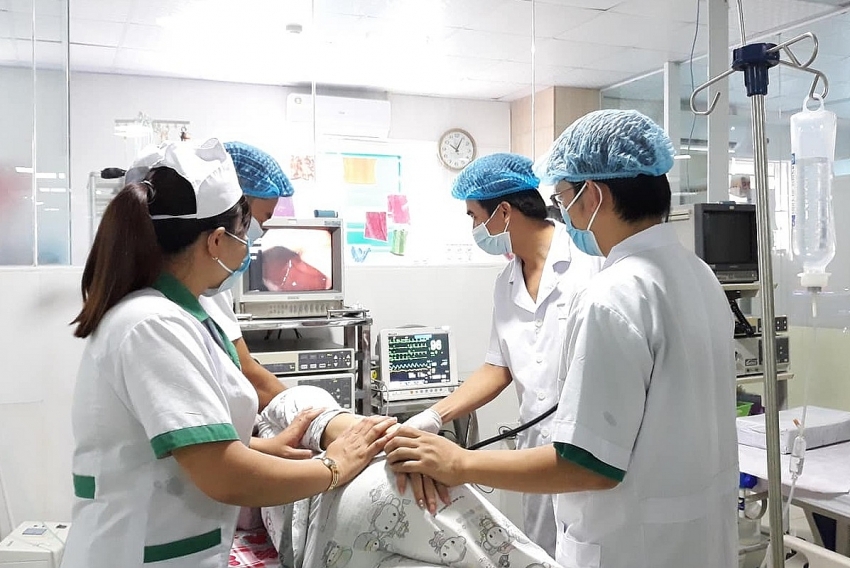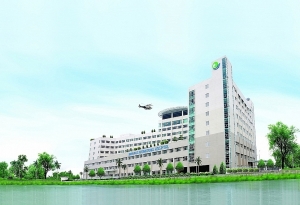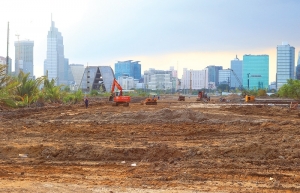New PPP legislation brings new motivation to private health funding
 |
| Quang Khoi General Hospital is constructing a new facility |
Quang Khoi General Hospital, one of the leading privately-run hospitals in the central region, is preparing to kick off the construction of a new facility in 2021 to cash in on growing healthcare demands.
“We will kick off the 2.5-hectare construction soon and put the new buildings into operation in 2023, with a capacity of 100 beds and an entertainment area for the elderly with the capacity to welcome 200,” Nguyen Van Khoi, board chairman at Quang Khoi General Hospital, told VIR.
Licensed by the Ministry of Health (MoH) to reform from a clinic to a general hospital in 2018, it has developed strongly ever since. It is estimated that Quang Khoi welcomes about 120,000 turns of patients each year, thus contributing to meeting the healthcare needs of the locals and helping ease the overload at central hospitals.
Quang Khoi is an example of an investment move among domestic private businesses in the health sector, which has been in need of huge capital for future development amid state budget constraints and growing demands for high-quality health services.
New motivations
According to experts at the World Bank and the International Finance Corporation, other countries alongside Vietnam are facing growing pressures on public services, especially healthcare. Thus, attracting private investment via public-private partnership (PPP) is considered the optimal solution for healthcare sector development.
A senior official at the MoH told VIR that, “The health sector is carrying out heavy tasks amid the challenges. Thus, we are encouraging private investors to join to fulfil our targets.”
“We are considering and appraising procedures for some PPP projects in healthcare infrastructure and medical equipment," the official added. "We are willing to welcome private investors to join.”
Thus far, despite the sector's importance, private investment in healthcare remains low due to some shortcomings, including a lack of a legal framework for PPP investment.
Tran Tien Quan, general secretary of the Vietnam Private Hospital Association, said that private investors are strongly interested in the healthcare sector. However, they are mostly concerned about the policy framework. They are waiting for changes to go ahead with investment projects.
Now some legal concerns are expected to be solved with the new Law on PPP Investment, which will take effect fron January 1, 2021 to become the key piece of legislation governing PPP transactions in the country.
According to the PPP law, health remains one of the priority sectors for PPP investment, thus creating an official legal framework for PPP in the healthcare sector.
Regarding the investment guarantee, investors of such projects will be ensured the right to access and use the land and other public assets.
Specifically, the state will hand over or lease land or allow them to use other public assets to implement PPP contracts. Moreover, PPP businesses will enjoy incentives in tax, land-use fee, land-leasing fee, and more in line with the prevailing rules on tax, land, and investment.
Moreover, the enforcement of the sector’s development strategies, growing market demands for qualified healthcare services, and the enforcement of the EU-Vietnam Free Trade Agreement (EVFTA) are the motivation to leverage private investment in healthcare.
The EVFTA is expected to lure in more EU firms as the landmark FTA will open the Vietnamese market in fields that businesses have been seeking particular solutions to for years, such as intellectual property rights (IPR), direct pharmaceuticals imports, and tenders, among others.
Pham Van Hoc, chairman of Hung Vuong General Hospital in the northern province of Phu Tho, said that the room for private investment in healthcare remains wide open.
In Latin America and Asia, private healthcare makes up 20-30 per cent while in the United Kingdom it is 10 per cent, 24 per cent in Thailand, and 93 per cent in India, but in Vietnam the figure only sits at 5.4 per cent.
At present, cities and provinces have been developing their healthcare systems and calling for private financiers from home and abroad to join. For instance, Hanoi planned to develop 15 new hospitals over five years by the end of 2020, with 5,000 beds worth VND8.6 trillion($373.9 million) in total. The city has especially been prioritising 100 per cent foreign-invested facilities with services using advanced technology, while encouraging investment in new urban areas.
In similar moves, Ho Chi Minh City has called for private investment in the local sector across 14 PPP ventures with a total investment capital of VND15 trillion ($652.17 million).
Experts said that the new PPP legislation will help increase the healthcare sector’s attraction, thus contributing to fulfilling the sector’s important tasks in the future.
What the stars mean:
★ Poor ★ ★ Promising ★★★ Good ★★★★ Very good ★★★★★ Exceptional
 Tag:
Tag:
Themes: Healthcare Platform
- PM outlines new tasks for healthcare sector
- Opella and Long Chau join forces to enhance digestive and bone health
- Hanoi intensifies airport monitoring amid Nipah disease risks
- Cosmetics rules set for overhaul under draft decree
- Policy obstacles being addressed in drug licensing and renewal
Related Contents
Latest News
More News
- Haiphong gains new growth impetus from strategic planning and integrated infrastructure (February 27, 2026 | 16:40)
- Kurz Vietnam expands Gia Lai factory (February 27, 2026 | 16:37)
- SK Innovation-led consortium wins $2.3 billion LNG project in Nghe An (February 25, 2026 | 07:56)
- THACO opens $70 million manufacturing complex in Danang (February 25, 2026 | 07:54)
- Phu Quoc International Airport expansion approved to meet rising demand (February 24, 2026 | 10:00)
- Bac Giang International Logistics Centre faces land clearance barrier (February 24, 2026 | 08:00)
- Bright prospects abound in European investment (February 19, 2026 | 20:27)
- Internal strengths attest to commitment to progress (February 19, 2026 | 20:13)
- Vietnam, New Zealand seek level-up in ties (February 19, 2026 | 18:06)
- Untapped potential in relations with Indonesia (February 19, 2026 | 17:56)





























 Mobile Version
Mobile Version